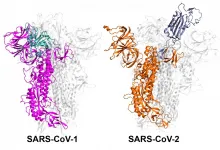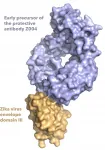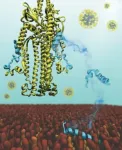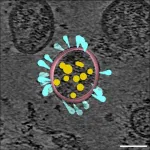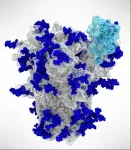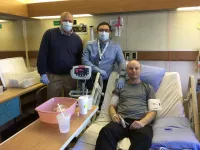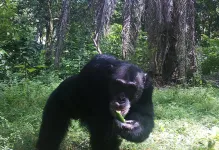Current liver cancer screenings may leave African Americans at greater risk
Mount Sinai study finds cancer disparities persist in African Americans
2021-02-25
(Press-News.org) New York, NY (February 25, 2021) -- Early detection could reduce the number of African Americans dying from liver cancer, but current screening guidelines may not find cancer soon enough in this community, according to a study published in Cancer in February.
Black patients with liver cancer often have a worse prognosis than those of other racial and ethnic groups. Mount Sinai researchers sought to understand the reasons for this disparity by studying patients with hepatitis C, the leading driver of liver cancer in the United States.
Hepatitis C virus infection can result in cirrhosis, which greatly increases the risk of liver cancer. Because of that risk, current guidelines emphasize the need for screening among patients who have already developed cirrhosis.
However, the rate of liver damage is slower among Black patients, and this study shows that the risk of liver cancer in Black patients with hepatitis C may begin earlier in the course of their liver disease, often before the onset of cirrhosis. Mount Sinai researchers found that nearly one-third of Black patients in their study would not have qualified for liver cancer screening using common cirrhosis measures.
In addition, the study found that at the time of diagnosis, the tumors in Black patients tended to be larger, more numerous, more aggressive, and more invasive.
"We know that disparities in outcome exist for Black patients with liver cancer. The reasons for this are complex and multifactorial, and this study points to two likely contributing factors," said lead author Umut Sarpel, MD, Associate Professor of Surgery, and Medical Education at the Icahn School of Medicine at Mount Sinai. "First, they may fall outside screening guidelines, thus delaying diagnosis. Second, the biology of their tumors may be inherently more aggressive. We suggest additional studies to see if modified guidelines can better serve this community and to determine if the tumors have a distinctive molecular signature that may allow targeted therapies to be deployed."
This research studied the imaging, laboratory, and pathological findings of 1,195 patients with liver cancer who had a history of hepatitis C exposure, 390 of whom identified as African American. It was a larger and more detailed investigation of findings first reported by co-author Andrea D. Branch, PhD, Professor of Medicine and the Director of Basic and Translational Research in the Mount Sinai Institute for Liver Medicine.
INFORMATION:
About the Mount Sinai Health System
The Mount Sinai Health System is New York City's largest academic medical system, encompassing eight hospitals, a leading medical school, and a vast network of ambulatory practices throughout the greater New York region. Mount Sinai is a national and international source of unrivaled education, translational research and discovery, and collaborative clinical leadership ensuring that we deliver the highest quality care--from prevention to treatment of the most serious and complex human diseases. The Health System includes more than 7,200 physicians and features a robust and continually expanding network of multispecialty services, including more than 400 ambulatory practice locations throughout the five boroughs of New York City, Westchester, and Long Island. The Mount Sinai Hospital is ranked No. 14 on U.S. News & World Report's "Honor Roll" of the Top 20 Best Hospitals in the country and the Icahn School of Medicine as one of the Top 20 Best Medical Schools in country. Mount Sinai Health System hospitals are consistently ranked regionally by specialty and our physicians in the top 1% of all physicians nationally by U.S. News & World Report.
For more information, visit https://www.mountsinai.org or find Mount Sinai on Facebook, Twitter and YouTube.
ELSE PRESS RELEASES FROM THIS DATE:
2021-02-25
Feb. 25, 2021 - A new paper published online in the Annals of the American Thoracic Society provides a roadmap that critical care clinicians' professional societies can use to address burnout. While strongly needed prior to the COVID-19 pandemic, the roadmap has taken on even greater urgency due to reports of increasing pandemic-related burnout.
In "Professional Societies' Role in Addressing Member Burnout and Promoting Well-Being," Seppo T. Rinne, MD, PhD, of The Pulmonary Center, Boston University School of Medicine, and co-authors from a task force created by the Critical Care Societies Collaborative (CCSC) describe a rigorous process they used to document 17 major professional ...
2021-02-25
The Clalit Research Institute, in collaboration with researchers from Harvard University, analyzed one of the world's largest integrated health record databases to examine the effectiveness of the Pfizer vaccine against COVID-19. The study provides the first large-scale peer-reviewed evaluation of the effectiveness of a COVID-19 vaccine in a nationwide mass-vaccination setting. The study was conducted in Israel, which currently leads the world in COVID-19 vaccination rates.
The results of this study validate and complement the previously reported findings of the Pfizer/BioNTech ...
2021-02-25
Boston, MA - A new approach to pooled COVID-19 testing can be a highly effective tool for curbing the SARS-CoV-2 pandemic, even if infections are widespread in a community, according to researchers at Harvard T.H. Chan School of Public Health and the Broad Institute of MIT and Harvard. Simple pooled testing schemes could be implemented with minimal changes to current testing infrastructures in clinical and public health laboratories.
"Our research adds another tool to the testing and public health toolbox," said Michael Mina, assistant professor of epidemiology at Harvard Chan School and associate member of the Broad. "For public health agencies and clinical laboratories ...
2021-02-25
ROCKVILLE, MD - Coronavirus outbreaks have occurred periodically, but none have been as devastating as the COVID-19 pandemic. Vivek Govind Kumar, a graduate student, and colleagues in the lab of Mahmoud Moradi at the University of Arkansas, have discovered one reason that likely makes SARS-CoV-2, the virus that causes COVID-19, so much more infectious than SARS-CoV-1, which caused the 2003 SARS outbreak. Moradi will present the research on Thursday, February 25 at the 65th Annual Meeting of the Biophysical Society
The first step in coronavirus infection is for the virus to enter cells. For this entry, the spike proteins on the outside of ...
2021-02-25
ROCKVILLE, MD - The Zika outbreak of 2015 and 2016 is having lasting impacts on children whose mothers became infected with the virus while they were pregnant. Though the numbers of Zika virus infections have dropped, which scientists speculate may be due to herd immunity in some areas, there is still potential for future outbreaks. To prevent such outbreaks, scientists want to understand how the immune system recognizes Zika virus, in hopes of developing vaccines against it. Shannon Esswein, a graduate student, and Pamela Bjorkman, a professor, at the California Institute of Technology, have new insights on how the body's antibodies attach to Zika virus. Esswein will present the work, which was published in PNAS, on Thursday, February ...
2021-02-25
ROCKVILLE, MD - If the coronavirus were a cargo ship, it would need to deliver its contents to a dock in order to infect the host island. The first step of infection would be anchoring by the dock, and step two would be tethering to the dock to bring the ship close enough that it could set up a gangplank and unload. Most treatments and vaccines have focused on blocking the ability of the ship to anchor, but the next step is another potential target. New research by Defne Gorgun, a graduate student, and colleagues in the lab of Emad Tajkhorshid at the University of Illinois addresses the molecular details of this second step, which could inform the design of drugs that block it. Gorgun will present her research on Thursday, February 25 at the ...
2021-02-25
ROCKVILLE, MD - The virus that causes COVID-19 belongs to the family of coronaviruses, "corona" referring to the spikes on the viral surface. These spikes are not static--to infect cells, they change shapes. Maolin Lu, an associate research scientist at Yale University, directly visualized the changing shapes of those spike proteins and monitored how the shapes change when COVID-19 patient antibodies attach. Her work, which was published in Cell Host & Microbe in December 2020 and will be presented on Thursday, February 25 at the 65th Annual Meeting of the Biophysical Society informs the development of ...
2021-02-25
ROCKVILLE, MD - One thing that makes SARS-CoV-2, the virus that causes COVID-19, elusive to the immune system is that it is covered in sugars called glycans. Once SARS-CoV-2 infects someone's body, it becomes covered in that person's unique glycans, making it difficult for the immune system to recognize the virus as something it needs to fight. Those glycans also play an important role in activating the virus. Terra Sztain-Pedone, a graduate student, and colleagues in the labs of Rommie Amaro at the University of California, San Diego and Lillian Chong at the University of Pittsburgh, studied exactly how the glycans activate SARS-CoV-2. Sztain-Pedone will present the research on Thursday, February 25 at the 65th Annual Meeting ...
2021-02-25
(Thursday, Feb. 25, 2021, Toronto)--Results of a world-first Canadian pilot study on patients treated with gene therapy for Fabry disease show that the treatment is working and safe.
The Canadian research team was the first to use gene therapy in 2017 to treat patients with Fabry disease, a rare, chronic illness that can damage major organs and shorten lives. They report their findings today in the journal Nature Communications.
"Being one of the first people in the world to receive this treatment, and seeing how much better I felt afterward, it definitely gives me hope that this can help many other Fabry patients and potentially those with other single gene mutation disorders," says Ryan Deveau, one of the ...
2021-02-25
Chimpanzees and humans "overlap" in their use of forests and even villages, new research shows.
Scientists used camera traps to track the movements of western chimpanzees - a critically endangered species - in Guinea-Bissau.
Chimpanzees used areas away from villages and agriculture more intensively, but entered land used by humans to get fruit - especially when wild fruits were scarce.
Researchers from the University of Exeter and Oxford Brookes University say the approach used in this study could help to inform a "coexistence strategy" for chimpanzees ...
LAST 30 PRESS RELEASES:
[Press-News.org] Current liver cancer screenings may leave African Americans at greater risk
Mount Sinai study finds cancer disparities persist in African Americans

